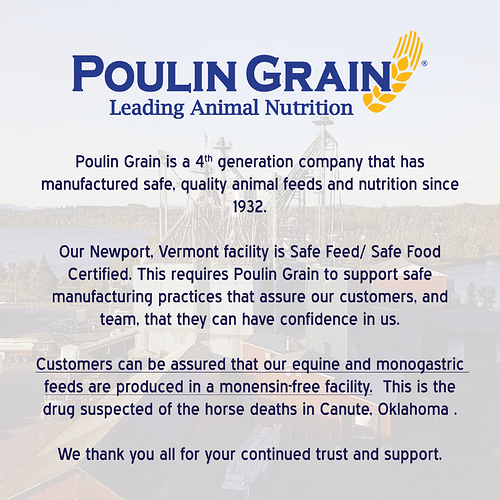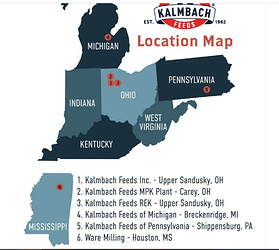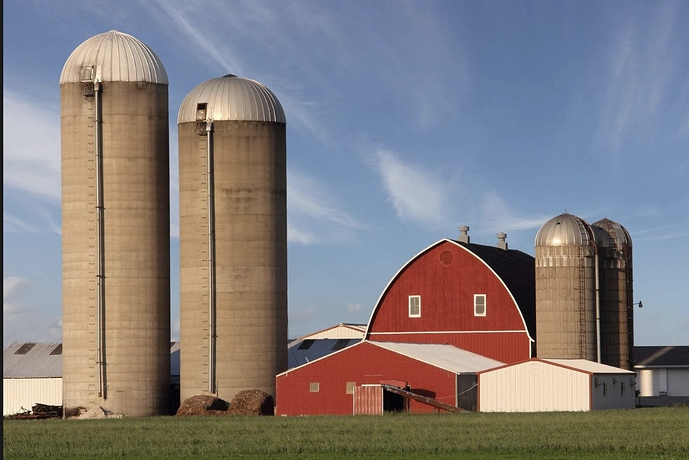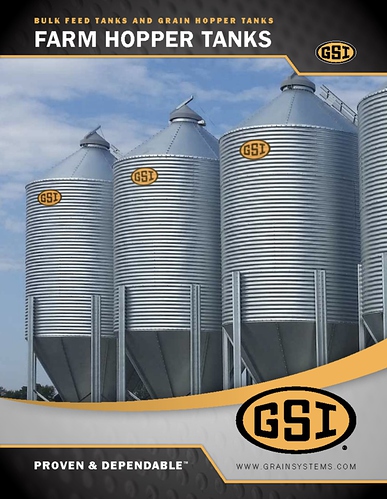I just saw this posted on Facebook.
Was there resolution in the other cases? Did they do enough testing and get to the bottom of it?
And I just got a phone call back from a Poulin rep in response to my inquiry, reaffirming that the medications are not present in facilities making horse feed. I was surprised by the personal call.
Tribute Feeds post on FB:
“We want horse owners to rest assured that all Tribute horse feeds are produced in company-owned, ionophore-free manufacturing facilities. Dr. Nicole Rambo, equine nutritionist, explains more in this short video.”
They came on and said the equine feed was made in a separate plant, no chance of contamination, and they get their grains from ionophore-free providers.
Their plant locations just FYI:
You can send a PM to someone whose profile is private (unless they are refusing PMs)
Go to your mailbox, select new message, then type in the screen name of the person you want to contact.
I’m so confused. If it was an intentional act by an AR group, why would they want the horses dead? Seems anti-thema to their mission.
Many Animal Rights activist do not care if the animals are dead as long as the humans can not use the to their liking. To them dead is better than humans using the animals.
Poisoning is horrible, as is letting a bunch of animals loose to starve to death in the wild under the name of releasing them. Animal Rights people frequently do things that an animal lover would not agree with.
In this case animal rights people would want to free the bucking horses from being used in the rodeo arena.
Honestly, I would not have been surprised if they targeted cattle as well.
Animal rights activists freed 10,000 mink in my state last year. They died nasty deaths as they had never been out in the wild before. Killed by other animals, hit by cars, starved to death.
Update with name of feed company and probable explanation: https://www.kake.com/home/feed-delivered-to-ranch-where-dozens-of-horses-died-was-contaminated-preliminary-tests-show/article_6f21a54a-69ed-11ef-a314-33f0e70db854.html
Livestock Nutrition Center, a company that supplies livestock feed across multiple states, said preliminary tests showed that a load of feed delivered to Beutler & Son Rodeo Company contained monensin, which can be toxic to horses. The incident likely occurred due to a failed cleanout procedure and a sensor malfunction, the feed supplier said in a statement.
“We have confirmed this is an isolated incident to this single load of feed from a single facility and no other feed has been impacted and is safe for animal consumption,” Ronnie Castlebury, the president of Livestock Nutrition Center, said in the statement.
When you go on their website, they are very clearly focused on cattle. Why 1) they would consider equine feed and 2) a ranch would consider them for their equine feed needs… I don’t know.
Would it have been cheaper, for a custom blend to be made and trucked in?
It looks like they are sponsored (the feed company was mentioned in a couple ig posts) maybe because of the family’s cattle side of the business?
I don’t know either, other than cost. But this company also killed deer with a custom deer mix, so apparently they didn’t have a problem making custom feeds for whomever.
Their past history of not following rules and regulations, of not seeming to care about checking into what ingredients are toxic, or not, to what species (ESPECIALLY since they seem to make custom mixes for non-cattle), and their lack of real follow through with cleaning up their last many hand slaps, is ridiculous.
I’d bet the horse farm was buying a standard mix that they were purchasing by the ton and then having it put into a silo. If they had fed bagged feed they probably would have been going through somewhere between 8 to 10 bags a day (possibly more; I’m not sure about the calorie requirements of bucking horses) and that’s just a pain to deal with. The silos are really convenient and some even will measure out the exact weight for you as it pours.
In more equine geared areas farms do this but usually purchase from an equine feed company. But in a place like Oklahoma id assume there are no custom mix mills that specialize in equine feed.
Buying bulk is cheaper but I’d assume it was for convenience not for cost savings.
I was more thinking an equine specific mill - apologies I wasn’t more clear. The bigger (smarter) boarding operations around do this for your exact reason - cost. But to buy equine feed from a cattle mill seems unnecessarily risky.
that was my first and only thought. This ranch must buy feed by the silo load. I have not seen any mention that any other farm had contamination
two generations of breeding and development, wiped out
It was a mix customized for them. It’s also possible there aren’t any other farms in the general are that get a custom mix from them
Well, I guess it would be an escalation but certainly not new for ARs to attack agriculture.
539 Attacks from Animal Rights Extremists Targeted Ag in 2022 - California Dairy Magazine
Typical bulk batches start at a 3 ton minimum, and go up by the ton from there. If it is a large farm, they could be taking as much as 10-12 tons or more at a time.
As a feed sales rep, when I priced out bulk feed for customers, there was not the amount of savings most people expected. Typically, it equated to the cost of the bags feed normally comes in, about .50 per bag, or about $25 per ton. But, you need to factor in the cost of the bin, site prep, concrete base, etc. Between those things, and maintenance that goes along with a bulk bin, many do not see much benefit, if any, to bulk feed.
Silos are generally used for silage or ensiling, as in a tradional silo on a farm, or large grain amounts, as in bigger than many houses. Most farms that use silage are moving away from silos, mainly due to cost and convenience.
Grain bins are used to store feed on farms, and can vary in size. Typically a bin on the farm will hold 3-4 tons, so you have room to refill before you are totally out.
The big concern in the situation is the amount of Rumensin in the feed. If it was more than enough to kill cattle, it was an incredible amount.
That combined with the fact this company had a major issue only 2 years ago speaks volumes of irresponsible manufacturing practices and terrible management. They should probably not be in business.
I would venture to guess that they are going to be hit with a huge lawsuit–and will be out of business soon afterwards.
Granted, I don’t have much knowledge of the horse scene in Oklahoma. But, I have family in an adjoining state that raises cattle and is heavily into cutting and reining.
It is HARD to get good feed there. Despite the fact that there’s a lot of horses and a lot of money in those horses most feed stores cater to cattle, with horses on the side. They may get in bagged grain but even then the feed stores may carry just the most commonly purchased grains.




